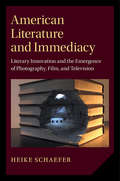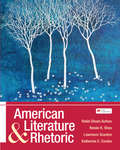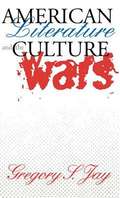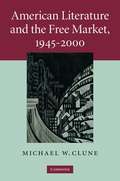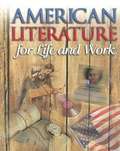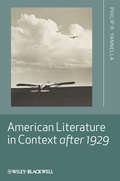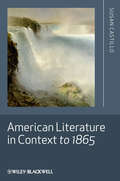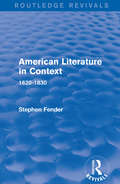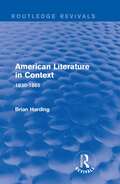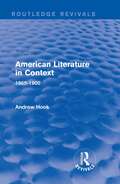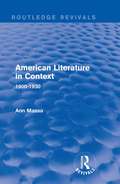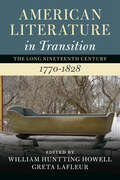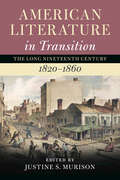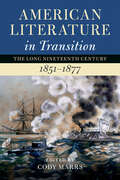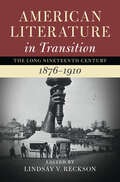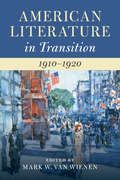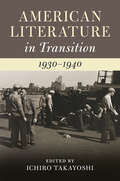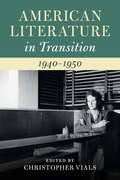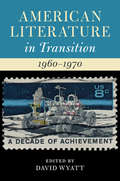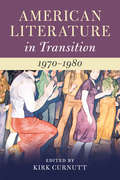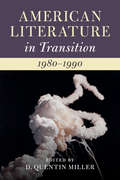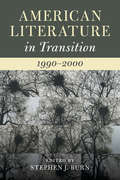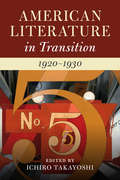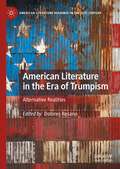- Table View
- List View
American Literature and Immediacy: Literary Innovation and the Emergence of Photography, Film, and Television (Cambridge Studies in American Literature and Culture #184)
by Heike SchaeferThe search for immediacy, the desire to feel directly connected to people or events, has been a driving force in American literature and media culture for the past two centuries. This book offers the first in-depth study of literary immediacy effects. It shows how the heightened reality effects of photography, film, and television inspired American writers to create new literary forms that would enhance their readers' sense of immediate participation in the world. The study combines close readings of Emerson, Whitman, Stein, Dos Passos, Coover, Foster Wallace, and DeLillo with detailed considerations of visual media to open up a new perspective on literary innovation and the ongoing cultural quest for increased immediacy. It argues that we can better understand how American literature develops when we consider experiments with literary form, not only in literary and cultural contexts but also in relation to the emergence of new media, their immediacy effects, and the larger changes in social life that they manifest and provoke.
American Literature and Rhetoric
by Lawrence Scanlon Robin Dissin Aufses Renee H. Shea Katherine E. CordesA book that�s built for you and your students.Flexible and innovative, American Literature & Rhetoric provides everything you need to teach your course. Combining reading and writing instruction to build essential skills in its four opening chapters and a unique anthology you need to keep students engaged in Chapters 5-10, this book makes it easy to teach chronologically, thematically, or by genre.
American Literature and the Culture Wars
by Gregory S. JayIn this book the author states that he will be: "...questioning both the scope and the purpose of American literary studies. What ends do we pursue in the study and teaching of an "American" literature? Has the idea of a canon of great books reached the end of its usefulness? Where does American literature end and Mexican or Caribbean or Canadian or postcolonial literature begin? Is multiculturalism the end of civilization as we know it or the start of an overdue regeneration of our politics and pedagogy? How has the political economy of making ends meet in an era of downsizing and privatization affected academic freedom and the course of academic study? What happens in the classroom when we try to put an end to the conventional ways in which we have conceived and taught our subject? Playing off the pun in the title of this introduction, then, I want to explore this set of questions about the "ends" of American literary studies. This exploration includes rethinking our ends both in the nominal sense of "pragmatic intention" (goal, aim, objective, design, scheme) and in the verbal sense of "reaching a conclusion" (limit, terminate, cease, halt, expire). By focusing attention on these many ends and the controversial issues they involve, I hope in part to explain how this once arcane academic discipline ended up at the center of the culture wars."
American Literature and the Destruction of Knowledge: Innovative Writing in the Age of Epistemology
by Ronald E. MartinIn this challenging work, Ronald E. Martin analyzes the impulse of major nineteenth- and twentieth-century American writers to undermine not only their inherited paradigms of literary and linguistic thought but to question how paradigms themselves are constructed. Through analyses of these writers, as well as contemporaneous scientists, mathematicians, philosophers, and visual artists, American Literature and the Destruction of Knowledge creates a panoramic view of American literature over the past 150 years and shows it to be a crucial part of the great philosophical changes of the period.The works of Melville, Emerson, Whitman, and Dickinson, followed by Crane, Frost, Pound, Stein, Hemingway, Dos Passos, Aiken, Stevens, and Williams, are examined as part of a cultural current that casts doubt on the possibility of knowledge itself. The destruction of concepts, of literary and linguistic forms, was for these writers a precondition for liberating the imagination to gain more access to the self and the real world. As part of the exploration of this cultural context, literary and philosophical realisms are examined together, allowing a comparison of their somewhat different objectives, as well as their common epistemological predicament.
American Literature and the Free Market, 1945–2000
by Michael W. CluneThe years after World War Two have seen a widespread fascination with the free market. Michael W. Clune considers this fascination in postwar literature. In the fictional worlds created by works ranging from Frank O'Hara's poetry to nineties gangster rap, the market is transformed, offering an alternative form of life, distinct from both the social visions of the left and the individualist ethos of the right. These ideas also provide an unsettling example of how art takes on social power by offering an escape from society. American Literature and the Free Market presents a new perspective on a number of wide ranging works for readers of American post-war literature.
American Literature for Life and Work
by Christine Bideganeta Larocco Elaine Bowe JohnsonThe four-volume Literature for Life and Work series continues with American Literature for Life and Work(Grade 11). These literature selections challenge students to think critically, work together in teams, and reflect on universal themes in life and work by reading selections from great American literature.
American Literature in Context after 1929
by Philip R. YannellaThis book situates American literature from the Great Depression to the present day in its historical contextExplores the issues that engaged American writers from 1929 to the presentDraws on a range of documents from magazine and newspaper accounts to government reports and important non-fictionThe book covers political ferment of the 1930s; post-World War II anti-Communism; post-War affluence; suburbanization and demographic change; juvenile delinquency, mental illness and the perception of the U.S. as a "sick" society; and post-1965 immigrationDesigned to be compatible with the major anthologies of literature from the periodEquips students and general readers with the necessary historical context needed to understand the writings from this period and provides original and useful readings that demonstrate how context contributes to meaning Includes a historical timeline, featuring key literary works, American presidents, and historical events
American Literature in Context to 1865
by Susan CastilloAmerican Literature in Context to 1865 discusses the issues and events that engaged American writers of the period, providing original and useful readings of important literary works that demonstrate how context contributes to meaningCovers a range of genres including the myths, chants and songs of indigenous cultures, sermons, slave narratives, essays and the novels and poetry to 1865Designed to be used alongside the major anthologies of literature from the periodEquips students with the necessary historical context needed to understand the writings from this periodPedagogical features include a detailed bibliography, and a transatlantic timeline, with literary works, and historical events
American Literature in Context: 1620-1830 (Routledge Revivals: American Literature in Context)
by Stephen FenderFirst published between 1982 and 1983, this series examines the peculiarly American cultural context out of which the nation’s literature has developed. Covering the years from 1620 to 1830, this first volume of American Literature in Context examines a range of texts from the writings of the Puritan settlers through the declaration of Independence to the novels of Fenimore Cooper. In doing so, it shows how early Americans thought about their growing nation, their arguments for immigration, for political and cultural independence, and the doubts they experienced in this ambitious project. This book will be of interest to those studying American literature and American studies.
American Literature in Context: 1830-1865 (Routledge Revivals: American Literature in Context)
by Brian HardingFirst published between 1982 and 1983, this series examines the peculiarly American cultural context out of which the nation’s literature has developed. Covering the years from 1830 to 1865, this second volume of American Literature in Context examines twelve major American writers of the three decades before the Civil War, including Edgar Allan Poe, Ralph Waldo Emerson, Henry David Thoreau, Herman Melville and Walt Whitman. The book also analyses the writing of two contemporary historians, an intellectual Journalist and Abraham Lincoln. Among the major themes discussed the religious heritage of New England Transcendentalism, sectional rivalries, tensions between self-culture and social awareness, and the widening gulf between the idea of national destiny and the fact of growing disunity. In addition, the dominant literary forms of the period – sermon, essay, travelogue – are related to the common cultural assumptions of the age. This book will be of interest to those studying American literature and American studies.
American Literature in Context: 1865-1900 (Routledge Revivals: American Literature in Context)
by Andrew HookFirst published between 1982 and 1983, this series examines the peculiarly American cultural context out of which the nation’s literature has developed. Covering the years from 1865 to 1900, this third volume of American Literature in Context focuses on the struggles of American writers to make sense of their rapidly changing world. In addition to such major figures as Walt Whitman, Henry James, Emily Dickinson and Mark Twain, it analyses the writings of an unorthodox economist (Henry George), a Utopian reformer (Edward Bellamy) and a critical sociologist (Thorstein Veblen). Particular attention is paid to the challenge to conventional literary and cultural values represented by writers such as William Dean Howell who pursued a new form of scientific, democratic realism in American writing. This book will be of interest to those studying American literature and American studies.
American Literature in Context: 1900-1930 (Routledge Revivals: American Literature in Context)
by Ann MassaFirst published between 1982 and 1983, this series examines the peculiarly American cultural context out of which the nation’s literature has developed. Covering the years from 1900 to 1930, this fourth volume of American Literature in Context focuses on how American literature dealt with the challenges of the period including the First World War and the stock market crash. It examines key writers of the time such as Henry James, Gertrude Stein, Ezra Pound, F Scott Fitzgerald and Eugene O’Neill who, unlike many Americans who sought escape, confronted reality, providing a rich and varied literature that reflects these turbulent years. This book will be of interest to those studying American literature and American studies.
American Literature in Transition, 1770–1828 (Nineteenth-Century American Literature in Transition)
by William Huntting Howell Greta LaFleur<p>This volume presents a complex portrait of the United States of America grappling with the trials of national adolescence. Topics include (but are not limited to): the dynamics of language and power, the treachery of memory, the lived experience of racial and economic inequality, the aesthetics of Indigeneity, the radical possibilities of disability, the fluidity of gender and sexuality, the depth and culture-making power of literary genre, the history of poetics, the cult of performance, and the hidden costs of foodways. Taken together, the essays offer a vision of a vibrant, contradictory, and conflicted early US Republic resistant to consensus accountings and poised to inform new and better origin stories for the polity to come.</p>
American Literature in Transition, 1820–1860: Volume 2 (Nineteenth-Century American Literature in Transition)
by Justine S. MurisonThe essays in American Literature in Transition, 1820-1860 offer a new approach to the antebellum era, one that frames the age not merely as the precursor to the Civil War but as indispensable for understanding present crises around such issues as race, imperialism, climate change, and the role of literature in American society. The essays make visible and usable the period's fecund imagined futures, futures that certainly included disunion but not only disunion. Tracing the historical contexts, literary forms and formats, global coordinates, and present reverberations of antebellum literature and culture, the essays in this volume build on existing scholarship while indicating exciting new avenues for research and teaching. Taken together, the essays in this volume make this era's literature relevant for a new generation of students and scholars.
American Literature in Transition, 1851–1877 (American Literature in Transition: The Long Nineteenth Century)
by Cody MarrsBetween 1851 and 1877, the U.S. underwent a whirlwind of change. This volume offers a fresh account of this important era, assessing the many developments - both major and minor - that transformed American literature. In a wide range of chapters, scholars re-examine literary history before, during, and after the Civil War, revealing significant changes not only in how literature is written but also in how it is conceived, distributed, and consumed. Cutting across literary periods that are typically considered separate and distinct, and incorporating an array of methods and approaches, this volume discloses the Long Civil War to be an era of ongoing struggle and cultural contestation. It thus captures the dynamism of this period in American literary history as well as its ever-evolving field of study.
American Literature in Transition, 1876–1910: Volume 4 (Nineteenth-Century American Literature in Transition #Volume 4)
by Lindsay V. Reckson<p>Addressing US literature from 1876 to 1910, this volume aims to account for the period's immense transformations while troubling the ideology of progress that underwrote much of its self-understanding. This volume queries the various forms and formations of post-Reconstruction American literature. It contends that the literature of this period, most often referred to as 'turn-of-the-century' might be more productively oriented by the end of Reconstruction and the haunting aftermath of its emancipatory potential than by the logic of temporal and social advance that underwrote the end of the century and the beginning of the Progressive Era. Acknowledging that nearly all US literature after 1876 might be described as post-Reconstruction, the volume invites readers to reframe this period by asking: under what terms did post-Reconstruction American literature challenge or re-consolidate the 'nation' as an affective, political, and discursive phenomenon? And what kind of alternative pasts and futures did it write into existence?</p>
American Literature in Transition, 1910–1920
by Van Wienen Mark W.American Literature in Transition: 1910-1920 offers provocative new readings of authors whose innovations are recognized as inaugurating Modernism in US letters, including Robert Frost, Willa Cather, T. S. Eliot, Ezra Pound, Gertrude Stein, H. D. , and Marianne Moore. Gathering the voices of both new and established scholars, the volume also reflects the diversity and contradictions of US literature of the 1910s. 'Literature' itself is construed variously, leading to explorations of jazz, the movies, and political writing as well as little magazines, lantern slides, and sports reportage. One section of thematic essays cuts across genre boundaries. Another section oriented to formats drills deeply into the workings of specific media, genres, or forms. Essays on institutions conclude the collection, although a critical mass of contributors throughout explore long-term literary and cultural trends - where political repression, race prejudice, war, and counterrevolution are no less prominent than experimentation, progress, and egalitarianism.
American Literature in Transition, 1930–1940 (American Literature in Transition)
by Ichiro TakayoshiAmerican Literature in Transition, 1930–1940 gathers together in a single volume preeminent critics and historians to offer an authoritative, analytic, and theoretically advanced account of the Depression era's key literary events. Many topics of canonical importance, such as protest literature, Hollywood fiction, the culture industry, and populism, receive fresh treatment. The book also covers emerging areas of interest, such as radio drama, bestsellers, religious fiction, internationalism, and middlebrow domestic fiction. Traditionally, scholars have treated each one of these issues in isolation. This volume situates all the significant literary developments of the 1930s within a single and capacious vision that discloses their hidden structural relations - their contradictions, similarities, and reciprocities. This is an excellent resource for undergraduate, graduate students, and scholars interested in American literary culture of the 1930s.
American Literature in Transition, 1940–1950 (American Literature In Transition Ser.)
by Christopher VialsIn the aftermath of World War II, the United States emerged as the dominant imperial power, and in US popular memory, the Second World War is remembered more vividly than the American Revolution. American Literature in Transition, 1940-1950 provides crucial contexts for interpreting the literature of this period. Essays from scholars in literature, history, art history, ethnic studies, and American studies show how writers intervened in the global struggles of the decade: the Second World War, the Cold War, and emerging movements over racial justice, gender and sexuality, labor, and de-colonization. One recurrent motif is the centrality of the political impulse in art and culture. Artists and writers participated widely in left and liberal social movements that fundamentally transformed the terms of social life in the twentieth century, not by advocating specific legislation, but by changing underlying cultural values. This book addresses all the political impulses fueling art and literature at the time, as well as the development of new forms and media, from modernism and noir to radio and the paperback.
American Literature in Transition, 1960–1970 (American Literature in Transition)
by David WyattThe decade of the 1960s has come to occupy a uniquely seductive place in both the popular and the historical imagination. While few might disagree that it was a transformative period, the United States remains divided on the question of whether the changes that occurred were for the better or for the worse. Some see it as a decade when people became more free; others as a time when people became more lost. American Literature in Transition, 1960–1970 provides the latest scholarship on this time of fateful turning as seen through the eyes of writers as various as Toni Morrison, Gary Snyder, Michael Herr, Amiri Baraka, Joan Didion, Louis Chu, John Rechy, and Gwendolyn Brooks. This collection of essays by twenty-five scholars offers analysis and explication of the culture wars surrounding the period, and explores the enduring testimonies left behind by its literature.
American Literature in Transition, 1970–1980 ( American Literature in Transition)
by Kirk CurnuttAmerican Literature in Transition, 1970–1980 examines the literary developments of the twentieth-century's gaudiest decade. <P><P>For a quarter century, filmmakers, musicians, and historians have returned to the era to explore the legacy of Watergate, stagflation, and Saturday Night Fever, uncovering the unique confluence of political and economic phenomena that make the period such a baffling time. Literary historians have never shown much interest in the era, however - a remarkable omission considering writers as diverse as Toni Morrison, Thomas Pynchon, Marilyn French, Adrienne Rich, Gay Talese, Norman Mailer, Alice Walker, and Octavia E. Butler were active.<P> Over the course of twenty-one essays, contributors explore a range of controversial themes these writers tackled, from 1960s' nostalgia to feminism and the redefinition of masculinity to sexual liberation and rock 'n' roll. Other essays address New Journalism, the rise of blockbuster culture, memoir and self-help, and crime fiction - all demonstrating that the Me Decade was nothing short of mesmerizing.
American Literature in Transition, 1980–1990
by D. Quentin MillerHistory has not been kind to the 1980s. The decade is often associated with absurd fashion choices, neo-Conservatism in the Reagan/Bush years, the AIDS crisis, Wall Street ethics, and uninspired television, film, and music. Yet the literature of the 1980s is undeniably rich and lasting. American Literature in Transition, 1980-1990 seeks to frame some of the decade's greatest achievements such as Toni Morrison's monumental novel Beloved and to consider some of the trends that began in the 1980s and developed thereafter, including the origins of the graphic novel, prison literature, and the opening of multiculturalism vis--vis the 'canon wars'. This volume argues not only for the importance of 1980s American literature, but also for its centrality in understanding trends and trajectories in all contemporary literature against the broader background of culture. This volume serves as both an introduction and a deep consideration of the literary culture of our most maligned decade.
American Literature in Transition: 1990–2000
by Stephen J. BurnWritten in the shadow of the approaching millennium, American literature in the 1990s was beset by bleak announcements of the end of books, the end of postmodernism, and even the end of literature. Yet, as conservative critics marked the century's twilight hours by launching elegies for the conventional canon, American writers proved the continuing vitality of their literature by reinvigorating inherited forms, by adopting and adapting emerging technologies to narrative ends, and by finding new voices that had remained outside that canon for too long. By reading 1990s literature in a sequence of shifting contexts - from independent presses to the AIDS crisis, and from angelology to virtual reality - American Literature in Transition, 1990-2000 provides the fullest map yet of the changing shape of a rich and diverse decade's literary production. It offers new perspectives on the period's well-known landmarks, Toni Morrison, Thomas Pynchon, David Foster Wallace, but also overdue recognition to writers such as Ana Castillo, Evan Dara, Steve Erickson, and Carole Maso.
American Literature in Transition: American Literature in Transition, 1920–1930
by Ichiro TakayoshiAmerican Literature in Transition, 1920-1930 examines the dynamic interactions between social and literary fields during the so-called Jazz Age. It situates the era's place in the incremental evolution of American literature throughout the twentieth century. Essays from preeminent critics and historians analyze many overlapping aspects of American letters in the 1920s and re-evaluate an astonishingly diverse group of authors. Expansive in scope and daring in its mixture of eclectic methods, this book extends the most exciting advances made in the last several decades in the fields of modernist studies, ethnic literatures, African-American literature, gender studies, transnational studies, and the history of the book. It examines how the world of literature intersected with other arts, such as cinema, jazz, and theater, and explores the print culture in transition, with a focus on new publishing houses, trends in advertising, readership, and obscenity laws.
American Literature in the Era of Trumpism: Alternative Realities (American Literature Readings in the 21st Century)
by Dolores ResanoThis edited collection offers an exploration of American literature in the age of Trumpism—understood as an ongoing sociopolitical and affective reality—by bringing together analyses of some of the ways in which American writers have responded to the derealization of political culture in the United States and the experience of a ‘new’ American reality after 2016. The volume’s premise is that the disruptions and dislocations that were so exacerbated by the political ascendancy of Trump and his spectacle-laden presidency have unsettled core assumptions about American reality and the possibilities of representation. The blurring of the relationship between fact and fiction, bolstered by the discourses of ‘fake news’ and ‘alternative facts,’ has not only drawn attention to the shattering of any notion of ‘shared’ reality, but has also forced a reexamination of the purpose and value of literature, especially when considering its troubled relation to the representation of ‘America.’ The authors in this collection respond to the invitation to reassess the workings of fiction and critique in an age of Trumpism by considering some of the most recent literary responses to the (new) American realit(ies)—including works by Colson Whitehead, Ben Winters, Claudia Rankine, Gary Shteyngart, Jennifer Egan, and Steve Erickson, to name but a few—, some of which were composed in the run-up to the 2016 election but were able to accurately and incisively imagine the world to come.
